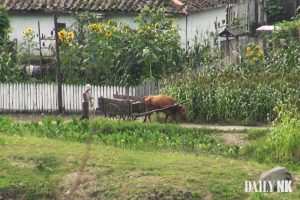The bacterial disease brucellosis is reportedly rampant in some parts of North Korea. According to a source, apprehension is building in rural communities with the number of outbreaks in the first half of the year alone far surpassing last year’s total.
In a telephone conversation with Daily NK on Thursday, a source in South Hamgyong Province said the outbreak of an “infectious bacterial disease at livestock farms” was becoming a “social issue.” He said brucellosis “is clearly on the rise” in the province since the start of the year.
The source said that according to data computed by provincial veterinarian authorities in South Hamgyong Province, there were brucellosis outbreaks at 138 state-run cattle farms and collective farms (about 600 animals) during the first six months of the year. “This is about double the 63 places [300 animals] from all of last year,” he said, speaking on condition of anonymity.
According to the source, brucellosis began with a small outbreak in South Pyongan Province in 2017 and a subsequent outbreak at 23 collective farms in South Hwanghae Province in 2018. It then spread to Chagang Province and North Pyongan Province. In 2019, there were outbreaks at 16 places in South Hamgyong Province.
“The animal disease control agency is predicting that if the current trend holds, the outbreak will grow even larger this year,” he said. “The situation demands urgent measures.”
Brucellosis is a bacterial disease that occurs in cattle, pigs, goats, and other livestock. In North Korea, it strikes mostly cattle.
Bovine brucellosis causes infertility and late term abortions in heifers and orchitis in bulls. Because of this, outbreaks reduce calf production, harming the incomes of agricultural households.
In South Korea, brucellosis is designated a Category II livestock infectious disease. Animals that test positive for the disease are culled. Infected cows are also kept separate from healthy ones before the relevant authorities decide on their slaughter.

In North Korea, however, infected cows are neither culled nor kept separate from healthy cows.
“Many dairy cows and work cows are dying due to brucellosis, but they are not being culled,” said the source. “On the contrary, the cows that die of disease are being used for food.
“Breeders are encouraging the spread of the disease because they don’t properly disinfect the surroundings,” he continued, adding, “Animal disease control experts in North Korea are frustrated that they’ll never eradicate brucellosis this way.”
Brucellosis is a zoonotic disease; that is to say, it can also infect people. People become infected usually through contact with infected animals, consuming unpasteurized milk or milk products from an infected cow, or consuming infected meat that has not been sufficiently cooked.
This means there is concern that the disease could spread to people who work in the livestock sector or who consume meat, by-products, or milk products from infected cows.
However, people infected with brucellosis do not display the same symptoms as infected cows. Infected people generally suffer fevers, chills, severe headaches, back pain, bone and joint pain, among other symptoms. Most patients recover within a few weeks even without treatment.
Since livestock farmers would have to suffer the entire economic loss should their animals be culled, they are apparently trying to salvage profits — no matter how little — by consuming or selling the meat, milk or by-products of infected cows.
This appears to be due to both insufficient understanding of infectious diseases and the failure of North Korean authorities to properly compensate farmers for culled livestock.
During an outbreak of African Swine Fever last year, there were several instances where locals consumed meat from infected pigs. This disease, however, cannot be communicated to people.

















